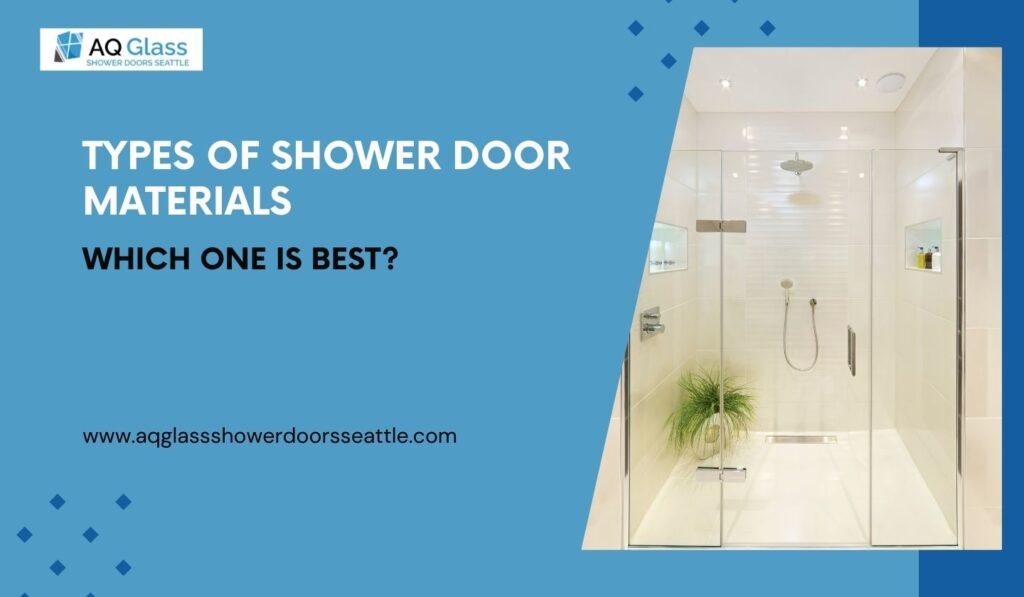When it comes to designing or renovating your bathroom, choosing the right shower door is essential. The material you select not only affects the door’s appearance but also its durability and maintenance needs.
In this blog post, we will explore the various types of shower door materials available, highlighting their pros and cons. This will help you make an informed choice that suits your style and functional needs. Whether you’re interested in Custom Shower Doors Installation Seattle or looking for standard options, understanding the materials will guide you in your decision-making process.
1. Tempered Glass
Overview
Tempered glass is one of the most popular materials for shower doors. It is created through a process of extreme heating and rapid cooling, making it much stronger than regular glass.
Pros
- Durability: Resistant to breakage, tempered glass is less likely to shatter compared to standard glass.
- Safety: If it does break, it crumbles into small, blunt pieces rather than sharp shards.
- Aesthetic Appeal: Offers a sleek and modern look that enhances any bathroom design.
Cons
- Cost: Generally more expensive than other materials.
- Installation: Requires professional installation due to its weight and handling precautions.
2. Acrylic
Overview
Acrylic shower doors are made from a type of plastic that is lightweight and flexible. They are often used as an affordable alternative to glass.
Pros
- Lightweight: Easier to handle and install compared to glass.
- Cost-Effective: Typically less expensive, making them a popular choice for budget-conscious homeowners.
- Variety of Styles: Available in various colors and finishes.
Cons
- Scratching: More prone to scratches than tempered glass, which can affect appearance over time.
- Less Durable: May warp or discolor with prolonged exposure to heat and moisture.
3. Polycarbonate
Overview
Polycarbonate is another type of plastic used for shower doors. It is known for its strength and impact resistance.
Pros
- High Durability: Extremely tough and resistant to impact, making it a safe choice for families.
- Lightweight: Like acrylic, polycarbonate is easy to handle and install.
- Good Insulation: Helps maintain temperature, making showers feel more comfortable.
Cons
- Cost: Can be more expensive than acrylic, though usually cheaper than glass.
- Less Clarity: Typically not as clear as glass, which can detract from the overall aesthetic.
4. Framed Glass
Overview
Framed glass shower doors consist of glass panels that are held in place by a metal frame, usually made of aluminum or stainless steel.
Pros
- Sturdiness: The frame adds support and stability to the glass, making it less likely to break.
- Variety: Available in various styles and finishes to match your bathroom decor.
- Cost: Generally more affordable than frameless options.
Cons
- Cleaning: The frames can accumulate grime and are harder to clean than frameless models.
- Less Modern: The presence of a frame can detract from a sleek, minimalist aesthetic.
5. Frameless Glass
Overview
Frameless glass shower doors are a contemporary choice that uses thicker glass panels without a surrounding frame.
Pros
- Sleek Design: Offers a modern and open feel to the bathroom.
- Easier Cleaning: Fewer crevices mean less buildup of soap scum and mildew.
- Customization: Can be tailored to fit unique shower shapes and sizes.
Cons
- Cost: Usually the most expensive option due to the thickness of the glass and the need for precise measurements.
- Installation: Requires professional installation to ensure proper support and safety.
6. Vinyl
Overview
Vinyl shower doors are often used in combination with other materials. They can be found in shower kits and are typically used for sliding doors.
Pros
- Affordability: Generally the cheapest option available for shower doors.
- Lightweight: Easy to install and handle.
- Waterproof: Vinyl is naturally resistant to water damage.
Cons
- Durability: Not as long-lasting as glass or acrylic, and may need replacement sooner.
- Aesthetic Limitations: Often considered less stylish than glass options.
Summary Table: Comparison of Shower Door Materials
| Material | Cost | Durability | Maintenance | Aesthetic Appeal |
| Tempered Glass | $$$ | High | Moderate | High |
| Acrylic | $ | Moderate | Low | Moderate |
| Polycarbonate | $$ | High | Moderate | Moderate |
| Framed Glass | $$ | Moderate | High | Moderate |
| Frameless Glass | $$$$ | High | Low | Very High |
| Vinyl | $ | Low | Low | Low |
FAQs About Shower Door Materials
1. What is the best material for shower doors?
The best material depends on your needs and preferences. Tempered glass is a top choice for durability and aesthetics, while acrylic is budget-friendly.
2. Can I install shower doors myself?
Many types of shower doors can be installed as DIY projects, but tempered and frameless glass often require professional installation.
3. How do I clean my shower doors effectively?
Use a mixture of vinegar and water for glass doors to prevent soap scum. For acrylic, use a gentle cleaner to avoid scratching.
4. Are frameless shower doors worth the cost?
Yes, they offer a modern look and are easier to clean, making them a popular choice for many homeowners.
Conclusion
Choosing the right material for your shower door can significantly affect the look and functionality of your bathroom. Whether you prefer the sleek design of frameless glass or the affordability of vinyl, each material has its unique advantages and disadvantages. When considering shower doors Seattle, think about your budget, maintenance preferences, and overall style.
By understanding the different types of materials available, you can make an informed choice that will enhance your space and last for years. If you’re interested in Custom Shower Doors Installation Seattle or need assistance with Shower Door Repair Seattle, feel free to reach out for expert advice. Your dream shower door is just a decision away!

